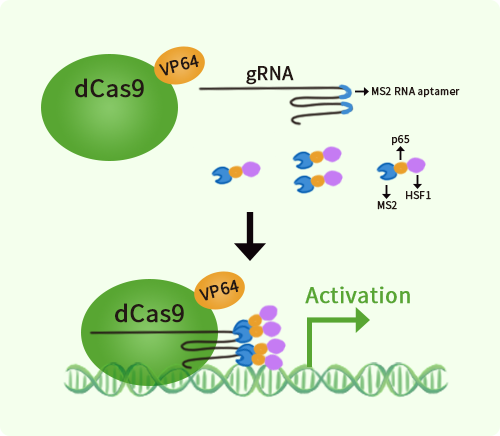Human BRCA1 activation kit by CRISPRa
CAT#: GA100468
BRCA1 CRISPRa kit - CRISPR gene activation of human BRCA1 DNA repair associated
CNY 12,255.00
CNY 1,999.00
CNY 2,700.00
CNY 18,784.00
CNY 800.00
Specifications
| Product Data | |
| Format | 3 gRNAs (5ug each), 1 scramble ctrl (10ug) and 1 enhancer vector (10ug) |
| Symbol | BRCA1 |
| Locus ID | 672 |
| Kit Components | GA100468G1, BRCA1 gRNA vector 1 in pCas-Guide-GFP-CRISPRa GA100468G2, BRCA1 gRNA vector 2 in pCas-Guide-GFP-CRISPRa GA100468G3, BRCA1 gRNA vector 3 in pCas-Guide-GFP-CRISPRa 1 CRISPRa-Enhancer vector, SKU GE100056 1 CRISPRa scramble vector, SKU GE100077 |
| Disclaimer | These products are manufactured and supplied by OriGene under license from ERS. The kit is designed based on the best knowledge of CRISPRa SAM technology. The efficiency of the activation can be affected by many factors, including nucleosome occupancy status, chromatin structure and the gene expression level of the target, etc. |
| Reference Data | |
| RefSeq | NM_007294, NM_007295, NM_007296, NM_007297, NM_007298, NM_007299, NM_007300, NM_007301, NM_007302, NM_007303, NM_007304, NM_007305, NM_007306, NR_027676 |
| Synonyms | BRCAI; BRCC1; BROVCA1; FANCS; IRIS; PNCA4; PPP1R53; PSCP; RNF53 |
| Summary | This gene encodes a 190 kD nuclear phosphoprotein that plays a role in maintaining genomic stability, and it also acts as a tumor suppressor. The BRCA1 gene contains 22 exons spanning about 110 kb of DNA. The encoded protein combines with other tumor suppressors, DNA damage sensors, and signal transducers to form a large multi-subunit protein complex known as the BRCA1-associated genome surveillance complex (BASC). This gene product associates with RNA polymerase II, and through the C-terminal domain, also interacts with histone deacetylase complexes. This protein thus plays a role in transcription, DNA repair of double-stranded breaks, and recombination. Mutations in this gene are responsible for approximately 40% of inherited breast cancers and more than 80% of inherited breast and ovarian cancers. Alternative splicing plays a role in modulating the subcellular localization and physiological function of this gene. Many alternatively spliced transcript variants, some of which are disease-associated mutations, have been described for this gene, but the full-length natures of only some of these variants has been described. A related pseudogene, which is also located on chromosome 17, has been identified. [provided by RefSeq, May 2020] |
Documents
Resources
| 基因表达相关资源 |
Other Versions
| SKU | Description | Size | Price |
|---|---|---|---|
| KN218505 | BRCA1 - human gene knockout kit via CRISPR, HDR mediated |
CNY 12,260.00 |
|
| KN218505BN | BRCA1 - human gene knockout kit via CRISPR, HDR mediated |
CNY 12,260.00 |
|
| KN218505LP | BRCA1 - human gene knockout kit via CRISPR, HDR mediated |
CNY 12,260.00 |
|
| KN218505RB | BRCA1 - human gene knockout kit via CRISPR, HDR mediated |
CNY 12,260.00 |
|
| KN418505 | BRCA1 - KN2.0, Human gene knockout kit via CRISPR, non-homology mediated. |
CNY 8,680.00 |


 United States
United States
 Germany
Germany
 Japan
Japan
 United Kingdom
United Kingdom
 China
China

